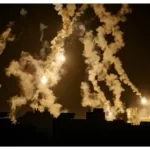In a recent statement, Ukrainian President Volodymyr Zelenskiy has contradicted the assessment put forth by Ukraine’s military Commander-in-Chief, General Valerii Zaluzhnyi, suggesting that the ongoing conflict with Russia has reached a stalemate. Additionally, a senior spokesperson from Zelenskiy’s administration criticized the general, alleging that such remarks would inadvertently favor the aggressor.
General Zaluzhnyi had made a candid evaluation of the situation in an interview published last week, drawing a parallel to the technological standstill of the First World War. He expressed uncertainty regarding the possibility of a significant and decisive breakthrough, citing the potential necessity of a technological leap forward. Furthermore, the general noted that Russia seemed to be gaining the upper hand due to its numerical superiority.
Moreover, Zaluzhnyi lamented the significant human cost of the conflict, estimating that at least 150,000 lives had been lost on the Ukrainian side. He underscored the stark contrast between the Ukrainian and Russian approaches to human life, characterizing the latter as a “feudal state” where human life is deemed expendable.
Acknowledging the prolonged nature of the warfare and its adverse effects on Ukraine’s position, Zaluzhnyi expressed concerns about Russia’s potential to rebuild its military capabilities, which could pose a long-term threat to Ukraine’s security.
In contrast, President Zelenskiy refuted claims of a stalemate during a press conference with the European Commission President, Ursula von der Leyen. He emphasized the ongoing need for cooperation with Western allies to bolster Ukraine’s air defenses. Zelenskiy acknowledged the hardships faced in the protracted conflict, which has now entered its 21st month, admitting that Kyiv has yet to achieve significant successes in its counteroffensive.
The President underscored the imperative of continued resistance, necessitating enhanced support from Western allies, particularly in the realm of air defense. Ukrainian forces have indeed made gradual advancements through vast Russian minefields, commencing a counteroffensive in the eastern and southern regions in early June. However, Russia has responded with robust military actions, especially in the eastern front.
Furthermore, President Zelenskiy’s aide, Ihor Zhovkva, censured General Zaluzhnyi for his remarks, cautioning that they could inadvertently benefit Russia’s interests. He emphasized that military assessments should not be disclosed to the public, as they could potentially simplify the aggressor’s tactics.
Simultaneously, the Kremlin has disputed General Zaluzhnyi’s assessment, asserting that the conflict has not reached a stalemate. Kremlin spokesperson Dmitry Peskov deemed it “absurd” for Kyiv to entertain the notion of an outright Ukrainian military victory.
On a related note, President Zelenskiy announced the appointment of a new commander for Ukraine’s special forces, Col Serhiy Lupanchuk. Notably, Ukraine’s special forces are believed to have executed some of the most sophisticated operations within areas under Russian control, particularly in Crimea. Recent actions include a strike in September targeting Russia’s Black Sea Fleet command headquarters in Sevastopol and attacks on naval assets stationed on the Crimean peninsula.
The reasons for this change in leadership remain undisclosed, and the former commander, Maj Gen Viktor Horenko, will assume new responsibilities within the defense ministry’s intelligence directorate. Horenko himself expressed surprise at the abrupt change, revealing that he learned of his reassignment through media sources.
As the conflict persists and evolving dynamics on the ground continue to unfold, the situation remains volatile and complex, with implications extending far beyond the Ukrainian border.”






